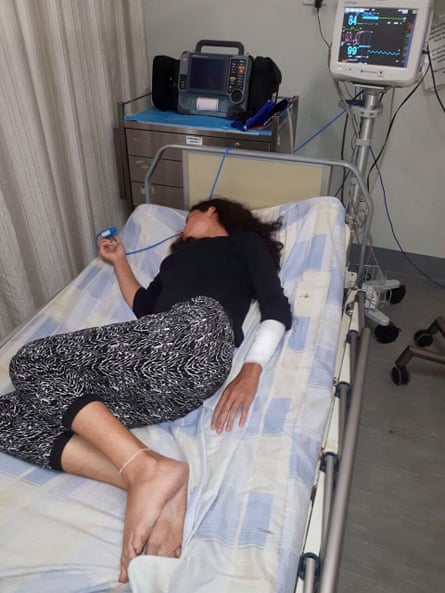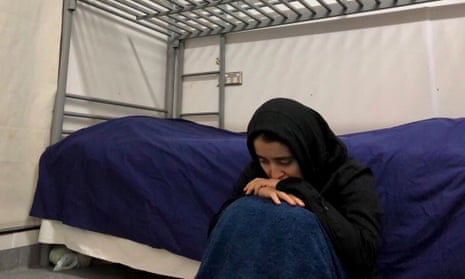On Thursday Médecins Sans Frontières took a rare step in front of the microphone and publicly criticised the Australian government, demanding an end to its offshore processing policy.
Six days earlier its team of mental health workers had been forced by the Nauru government to abruptly stop work and leave the island – and their very sick patients.
MSF’s relationship with the government had been strained, but this came without warning or explicit reason.
Attempts to negotiate failed, and the team’s visas were cancelled on departure “to make it clear there was no intention of inviting us back”, MSF Australia director Paul McPhun said.
In an emotional press conference McPhun, Dr Beth O’Connor and Dr Christine Rufener detailed exactly how the Australian policy of “trapping” people on Nauru was breaking people.
O’Connor said there was no therapeutic solution for their patients as long as they remained on the island, but “I fear the withdrawal of MSF’s psychiatric and psychological health care from Nauru will claim lives”.
Among the refugees left behind are some dangerously ill young people.
‘The utter destruction of hope’
Ali* fears for the life of his 30-year-old sister Mina*, who is currently being fed through a tube in the detention centre’s RPC1 compound. She had attempted suicide or self-harm multiple times in recent weeks, Ali said, refusing food and sleeping with a knife next to her.
Medical documents seen by Guardian Australia revealed a long history of mental and physical health problems, including depression, anxiety, suicidal ideation and paranoia. Mina had been working in admin at the Nauru airport, learning English and practising yoga, but she began to seriously decline four weeks ago.
“It is not known if there was a clear precipitating factor to her depression but there was a suggestion of sexual assault,” an internal report said.
“She presented as an emaciated and dehydrated young woman lying in her bed,” a psychiatrist wrote last week.
“She appeared pale with cracked lips, she was trembling and appeared psychomotor agitated … There was no spontaneous speech but she provided brief answers to my questions … Her level of distress was such that I abandoned further questioning and [medicated her].”
Ali* told Guardian Australia Mina was on a long waiting list to receive psychotherapy, and they are both on a waiting list for a caseworker and legal help with an Australian based advocacy organisation.
When MSF left Nauru, Australia’s minister for home affairs, Peter Dutton, wrongly said the organisation had never been contracted to treat refugees. He said there were 64 mental health staff on the island and that his government’s contractor, International Health and Medical Services, fulfilled required needs.
However, Mina’s health documents reveal that even IHMS did not have the power to refer her to the supported accommodation in RPC1. That was up to the government of Nauru.

“Our responsibility was to submit the application,” IHMS told Ali.
“I feel like an empty shell, on death row,” Mina told Guardian Australia last week, before she was eventually transferred.
“I am fearful for the life of my young sister which has been neglected for so long,” Ali said.
On Thursday MSF’s Rufener compared what she described as the “indefinite trapping” of people on Nauru to what she had seen treating refugees in Lesbos, Greece, and in a clinic for survivors of sexual violence, torture and trauma.
The difference on Nauru was “the utter destruction of people’s sense of hope”.
She said the word she heard most often from patients in therapy sessions was “destroyed”.
Separated for four years
MSF’s McPhun said the five years of “indefinite limbo” endured by refugees and asylum seekers on Nauru had led to a radical deterioration in their mental health and wellbeing.
He, Rufener and O’Connor all noted the impact of family separation under the offshore policy – a key factor in people’s distress and a situation the Australian government provides no exception for.
“Separating families, holding men, women and children on a remote island indefinitely with no hope of protection, except in the case of a medical emergency, is cruel and inhumane,” said McPhun.
Narges and Daryoush, Afghan Hazara siblings in their mid-20s, have been separated from their sister and parents for more than four years.
Their sister, Mahboubeh, and mother, Nasreen, were transferred to Australia in August 2014 because of Nasreen’s debilitating health problems.
In June the pair lost their friend Fariborz Karami, who took his own life in the neighbouring tent, and their mental health deteriorated further.
Health workers have repeatedly recommended the family be reunited for the sake of their mental health.
“The environment in Nauru, with separation from her family is not conducive to recovery from her mental illness,” said one medical report on Narges.
“The longer the duration of her symptoms, more difficult it will be for Narges to achieve recovery in the future and therefore intervention should occur for her to recover as soon as possible”.
The complications of the family’s separation mean it is virtually impossible under current policies for them to settle anywhere in the world together. Narges and Daryoush will not be brought to Australia. They can only apply for US resettlement as a family group if they are physically together on Nauru, but Nasreen is too ill to return.
In April the federal opposition suggested the family could be helped if the government simply let their mother and sister apply for US citizenship from Australia. That would at least allow the four of them to resettle safely together. Their father is already in Australia, resettled as a refugee after arriving some time before his family, and cannot join them in either place.
In September a psychiatrist noted Narges was no longer engaging.
“Ongoing counselling does not appear to be useful,” he said.
In the meantime the family waits and hopes for ministerial intervention or, failing that, a legal one.
There are many theories about why MSF was kicked off the island – including some which relate to domestic politics – but observers have suggested the fact that, unlike IHMS, MSF policy allows patients to request copies of their medical records.
Those records have often been passed to lawyers, who have successfully used them as evidence of the need for an urgent medical transfer to Australia.
McPhun would not speculate other than to note the expulsion had occurred very quickly, and that it would no doubt have a dangerously detrimental affect on their patients left behind.
“You can’t wind a program down in a couple of days, it’s absurd,” he said.
“It’s medically irresponsible to try. That would not have been the way at all MSF would have gone about relinquishing its responsibilities for the health care of people on the island.”
*Names have been changed
